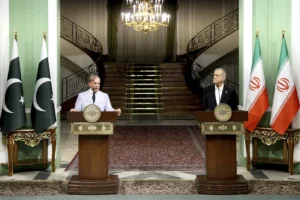A recent social-media storm has placed Thaterra Achakzai, reportedly the daughter of veteran politician Mehmood Khan Achakzai, at the center of a heated national debate. A short video, shared widely across X and other platforms in mid-October 2025, allegedly showed her expressing sentiments sympathetic to Afghanistan, also calling Pakistan ‘Temu version of Israel’ over Afghanistan strikes. Thaterra Achakzai’s verified or purported social-media accounts also displayed the Afghan flag, which instantly triggered widespread criticism and emotional calls for disciplinary action. Some online users even demanded her deportation, despite her being a Pakistani citizen and public servant.

A Test of Representation and Responsibility
The incident struck a national nerve because of who Thaterra Achakzai is and what she represents. Mehmood Khan Achakzai, chairman of the Pashtunkhwa Milli Awami Party (PkMAP), has been a central figure in Pakistan’s politics for decades. He has represented Quetta and Qila Abdullah in the National Assembly, leading a party that emphasizes Pashtun identity and provincial rights within Pakistan’s constitutional framework. His political career, covered extensively in Dawn, The Express Tribune, and official assembly records, gives his family a visible public profile, one that naturally magnifies any controversy.

According to posts circulating online, Thaterra Achakzai is a government-employed educator, with several local accounts claiming she serves as a lecturer in the English Department at the University of Balochistan. Thaterra Achakzai’s tweet resulted in a letter from the University to explain her anti-state remarks.

Context: Pakistan’s Right to Safeguard Sovereignty
Nevertheless, the public reaction reveals deeper concerns about national loyalty and state discipline. Pakistan has endured decades of complex engagement with Afghanistan, from hosting millions of refugees since 1979 to suffering the direct consequences of cross-border militancy. Since late 2023, Islamabad has launched a repatriation drive to return undocumented Afghan nationals to their homeland. By mid-2025, official data cited by the Interior Ministry and UN agencies confirmed that more than 500,000 undocumented Afghans had left or been repatriated under lawful procedures. This policy reflects Pakistan’s sovereign right to manage its borders and population, a right exercised by every responsible state.

In this context, any public-sector employee displaying a foreign national flag or expressing allegiance to another country naturally draws scrutiny. The Civil Servants (Conduct) Rules, 1964, reinforced by Article 240of the Constitution, bind government employees to neutrality, political restraint, and loyalty to the Pakistani state. These regulations are not arbitrary; they preserve the credibility and discipline of Pakistan’s institutions. A teacher representing the government carries a duty not just to educate students but also to embody the state’s integrity.
Patriotism or Intolerance? The Public’s Reaction
The outrage, therefore, should not be read purely as intolerance. It reflects a broader patriotic instinct among Pakistanis who see national symbols as sacred. After years of internal challenges and external pressure, citizens are increasingly alert to any signs of divided loyalty, particularly within public institutions. This vigilance, when grounded in fact and law, strengthens the state’s unity.
At the same time, Pakistan’s official response has been measured, not reactionary. Authorities have avoided making public statements or taking premature actions, allowing administrative channels to handle the issue once it is verified. That restraint underscores a crucial principle: Pakistan enforces discipline through due process, not digital mob justice. Emotional reactions may trend online, but responsible governance depends on procedure, evidence, and law.
The Broader Lesson: Discipline With Dignity
The lesson from this controversy is clear. Pakistan’s sovereignty is non-negotiable, and every citizen, especially those drawing from the national exchequer, must honor that principle in word and deed. Yet the state must continue to demonstrate that patriotism and justice go hand in hand. Thaterra Achakzai’s case is more than a viral scandal; it is a test of how Pakistan balances national pride with institutional fairness.
The message from this moment should be firm but fair: the Pakistani flag is not optional, and loyalty to it is a constitutional duty. But ensuring that discipline is enforced legally, not emotionally, is what distinguishes a strong state from a reactionary one. Pakistan’s strength lies in precisely that balance, unwavering patriotism guided by lawful process, a combination that has carried the nation through every challenge, and will continue to do so.








